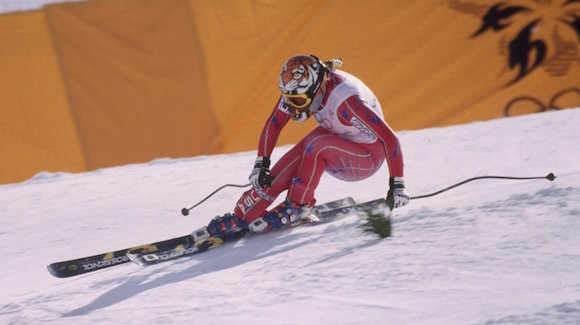What Makes a Champ: Picabo Street

From local ski hills to the PyeongChang Olympics, the U.S. Ski and Snowboard Association (USSA) encompasses all athletes that share a passion for skiing and snowboarding. We explore what makes each skier and rider a champion with stories from the U.S. Ski Team, U.S. Snowboarding and U.S. Freeskiing, next to kids winning a NASTAR medal, landing their first cork 7 or joining a club team. Alongside USSA’s mascot Champ, take a look at how all of these athletes strive to be Best in the World.
As we continue to explore what makes USSA athletes champions, we’re learning more than we ever expected. Being a champion goes beyond the medals and the titles. It’s someone with great character and an undying belief in themselves; it’s someone who loves their sport with an unmatched passion. We are honored to share these stories with you. In this installation, U.S. Ski Team Content Manager Courtney Harkins sits down with Picabo Street to discuss #WhatMakesAChamp.
You’ve heard the name Picabo Street. You may have read her book or know the crazy history of her name. You may remember her winning a gold at the Nagano Olympics or have watched her take a world champion title. She was the first American woman to ever win the overall world cup downhill title. She’s Lindsey Vonn’s childhood idol. She’s a National Ski Hall of Fame inductee.
But Street fell off the map for a little while. You’d spot a glimpse of her on social media when she’d attend a World Cup or when she helped raise money for U.S. Ski Team athletes, but mostly she lived a quiet life, raising her three boys in Alabama.
Recently, she’s moved back to Park City, UT—the home of the U.S. Ski Team headquarters—and is following her next dream: mentoring and educating kids.

Street celebrates after winning her gold medal in the 1998 Olympics. (Getty Images-Jerome Prevost)
“I managed to get through high school,” said Street. “But I made the U.S. Ski Team at 15 and 180 days at a school desk went out the window. I ended up going with an Alaska correspondence school and finished using snail mail.”
This gave her an idea. What if she could help elite athletes go through school at their pace and tailor a specific program around their sports? “Whether the kid is a ski racer, a snowboarder, a hockey player or a horseback rider, when he or she reaches that elite level, there’s a ton of travel required,” said Street. “School takes a backseat, but it shouldn’t have to.”
Street teamed up with Michelle Demschar—former USSA domestic alpine program director, executive director of the Australian Ski Federation and high school teacher—and Dan Kemp—a longtime educator, program developer and school headmaster. The three of them put their heads together to figure out an education model that would work for these types of kids.
With sports becoming a year-round endeavor, the three decided on a 12-month school with rolling enrollment and a virtual curriculum supported by live teachers in a physical classroom. Because of travel schedules and training, it’s hard to make a traditional 9-month calendar work successfully for higher-level athletes with college aspirations.

A student is tutored at Picabo Street Academy.
“Kids go to a training camp and come back behind schedule,” shared Kemp. “They’re always playing catch up and they’re anxious about it. They’re worried about being behind and what their teachers are going to say. And parents worry too – they want to be sure their kids are not sacrificing their education for their sport. They shouldn’t have to deal with that kind of anxiety.”
With all of this in mind, Kemp, Demschar and Street started Picabo Street Academy. Students can attend class at the school in Park City to work with teachers, or take their work with them on the road. Kids can drop by before an afternoon workout, during a training break or at night before dinner. They can work with a Spanish tutor in the classroom, attend online AP courses or take a math test.
“It’s not days in the seat; it’s about course mastery, which allows students to move at the pace that suits them,” said Demschar. “It’s great for college preparedness as students figure out their schedules and classes to fit around their sport – they really learn about time management! We help students plan their academic pathway to set them up for success both in and out of the classroom.”
Demschar, Kemp and Street watch an online system to help manage the calendar of classes, assignments and extra-curricular activities, working with the students to keep them accountable. “It’s perceived freedom within a structured environment,” laughed Street.

Similarly, they’re tailoring classes around what the student athletes are already doing. “When a student is traveling to Italy for a camp, we’ll have them take a photography elective around their travels,” said Kemp. “They get to go to amazing places and do amazing things. Why wouldn’t we work into that?
“Because regulations require gym classes, a traditional school has the student take PE. We’ve talked to athletes that almost didn’t graduate high school on time because they didn’t take enough PE credits,” he continued. “We realize our students are always being physical—they’re at dryland training or running gates at the mountain. That counts as PE for us.”
But the academic rigor is high at Picabo Street Academy. “We encourage kids to look at their education as their own,” said Street. “We’re the support net around them to get them where they want to go. We’re here to work together for a common goal: the highest level of education and the highest level of athletic performance.”
Another part Street felt strongly about is scholarship. She’s working on finding the right kinds of kids and getting them academic funding when needed. “I wish I had this when I was racing. I’m happy to be a champion for education and sport. This is close to my heart,” she said with her eyes closed.
You’ll still see Street at World Cup races, cheering on the U.S. Ski Team, but she’s gone from gold medals to yellow pencils. It’s not just ski racing that makes her a true champion any longer. Picabo took some time to answer our three questions on what makes her a champion now.
U.S. SKI TEAM: In your words, what makes a champion?
PICABO STREET: A champion is someone willing to do whatever it takes to succeed and own it once they had—whether it’s on the hill or in the classroom.
U.S. SKI TEAM: Do you remember the first time you felt like a champion?
PS: I felt like a champ the first time I ski raced. It was in Sun Valley, ID on Dollar Mountain in the Kindercup. I won. But I also felt like a champ when I opened my first uniform back from the U.S. Ski Team. And I felt like a champion when I returned from my adversities. And of course, I felt like a champion when I won my gold. Is that too many?
U.S. SKI TEAM: What is the biggest piece of advice you have for aspiring kids who want to be sitting where you are today?
PS: Prepare well. Work harder than you think you can. Believe. Spend as much time in the NOW as possible. And don’t forget to smile when you make it.
